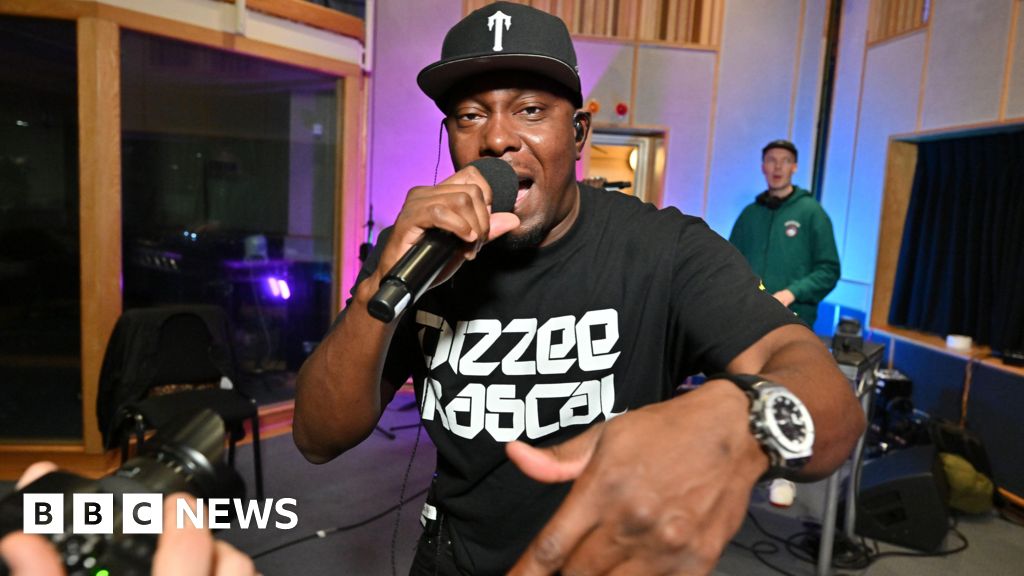ARTICLE AD BOX
By Paul Glynn
Entertainment & arts reporter
Image source, Year of the Dog
Image caption,Primal Scream's Simone Butler challenges perceptions about the relationship between homeless people and their dogs in the documentary Year of the Dog
When Primal Scream bassist and dog-lover Simone Butler went looking for a canine companion of her own two years ago, she ended up finding out more than she could ever have imagined about the relationship between mankind and its best friend.
As part of her search, the Soho Radio DJ and presenter interviewed Michelle Clark, who founded and runs Dogs on the Streets (DOTS), a group of volunteers dedicated to the welfare of dogs belonging to the UK's homeless community.
Concerned about the often negative perceptions about the relationship, Simone's heart-rending and heartwarming new documentary, Year of the Dog, investigates whether it is fair to have a dog when you are homeless.
The answer, it's no spoiler to say, is a resounding yes.
"I went into the film with some degree of preconception," Simone tells the BBC. "[But] I realised that the dogs on the streets are so incredibly loved, they are always with their owners.
"The owners will feed the dogs before they feed themselves.
"The street dogs are incredibly well behaved and I never saw any aggression. Which is very different from dogs that maybe stay in a lot or don't see their owners, and then go out and go past one other dog in the street and there's a fight between them," she adds.
"The dogs on the streets are so socialised that that never really happens."
'Reason for living'
The hour-long film shows narrator Simone, Michelle and the other "amazing humans" who work for DOTS helping homeless people and their dogs, who may be in need of veterinary and/or administrative support.
It also depicts what happens to the dogs, physically and emotionally, when their human guardians are suddenly no longer able to be with them.
One recently rehoused man is heard declaring that he would be "dead or in jail" now if it wasn't for his dog.
"We wanted to give people a more in-depth view of what it's like being on the street with a dog, and to delve into that relationship and that unconditional love," says Simone.
"It doesn't change at all, just because someone doesn't have a roof over their head. In fact, it's a lifeline. It's a reason for living."
Image source, Year of the Dog
Image caption,Dogs on the Streets is a charity run by volunteers dedicated to the welfare of dogs belonging to the UK’s homeless community
Many of DOTS' clients, Michelle explains, first became rough sleepers "because of the barriers out there with housing". Especially those whose domestic situations have recently changed.
While having a dog does "widen the barrier" for them, in terms of quickly finding suitable accommodation again, the relationship gives them "routine, companionship and responsibility" as well as some semblance of control back, she adds.
'Isolated life'
In the middle of filming Year of the Dog, all sense of control was lost when Covid struck, with at least two DOTS clients losing their lives to the virus.
In order to help stop its spread, the government launched its Everyone In initiative, which has provided more than 37,000 rough sleepers with a place to stay during the pandemic. Many hotels and buildings that were suddenly out of action were used to house previously homeless people.
However, once the initial strict lockdown ended, these buildings were needed again and many people found themselves back out on the streets.
According to the homeless charity Shelter, in August, fewer than one in four homeless people housed via the scheme had moved into permanent accommodation, figures the government has described as misleading. A spokeswoman for the Department for Levelling Up, Housing and Communities told the BBC this week that 26,000 people had done so.
Warning: Third party content may contain adverts
Michelle is keen to stress that local councils do still have the power to accommodate anyone who is deemed to be at risk or vulnerable.
But rough sleepers, she points out, live "where there is society, socialisation, public [and] space".
"When you put these people into emergency Covid [accommodation], they're placed in a room with four walls, they're cut off from socialisation, they're cut off from routine.
"They still have their mental health [problems] and alcohol and drug addiction - if they're going through that - and they're not accessing what they need to help this.
"So in effect, as much as it sounds crazy, I used to actually say they were safer and better on the street because they live a very isolated life anyway."
'Tell their truth'
Last month, Shelter warned that the number of homeless people could surge this winter, because of the end of Covid protections.
Director Paul Sng, wants the new film to challenge the stigmatisation and demonisation of homelessness people and their dogs.
"There are plenty of documentaries and plenty of reality shows that paint vulnerable people in a not-so positive light, and paint them as victims, a drain on society," he says.
"So what we want to always make is something that has a humanity, that's empathetic.
"People can speak for themselves," he goes on. "You don't need to necessarily put words in their mouths, you just need to provide a safe environment and an opportunity for them to tell their truth."
Image source, Year of the Dog
Image caption,Simone alongside Roxanne from DOTS at the charity's sanctuary, where dog Brindell lived for a while after her owner was put in a safe house
The film's dramatic opening scene shows an unsympathetic member of the public engaging Simone and the DOTS team in a heated discussion, questioning the charity's motives and the morality of homeless people having dogs.
While such incidents are quite rare, Michelle says, she admits the charity does encounter more issues with rough sleepers who don't have dogs, asking why the animals are taking up their resources.
Many members of the public are "very giving", she notes, particularly over the festive season, but that can drop off in January.
"Homelessness isn't just for Christmas," says Michelle. "It's a bit like a dog. Homelessness is 365 days a year, 24/7.
"January is actually the hardest month for our rough sleeping community," she adds. "We find we are needed more then to help lift them and support them.
"Rough sleepers with dogs say, 'Everyone remembers the name of my dog, but they never remember the name of me'. These people do matter, they're not invisible."
Image source, Year of the Dog
Image caption,Simone met many homeless people and their dogs in the documentary, like Gary and Lola pictured here
While Simone threw herself fully into the dog-umentary, she is still yet to find a dog to call her own.
Her band will belatedly mark the 30th anniversary of their album Screamadelica this summer, with a string of live shows, so touring could make it trickier.
For now, she remains as the go-to dog-sitter for all her mates.
"One of my friends said, 'One day you have a dog, the next day you have a member of the family you would die for'," she says. "I think that's true."
Year of the Dog is available to watch online from 10 January, via Amazon, Google Play and iTunes.

 3 years ago
78
3 years ago
78








 English (US) ·
English (US) ·